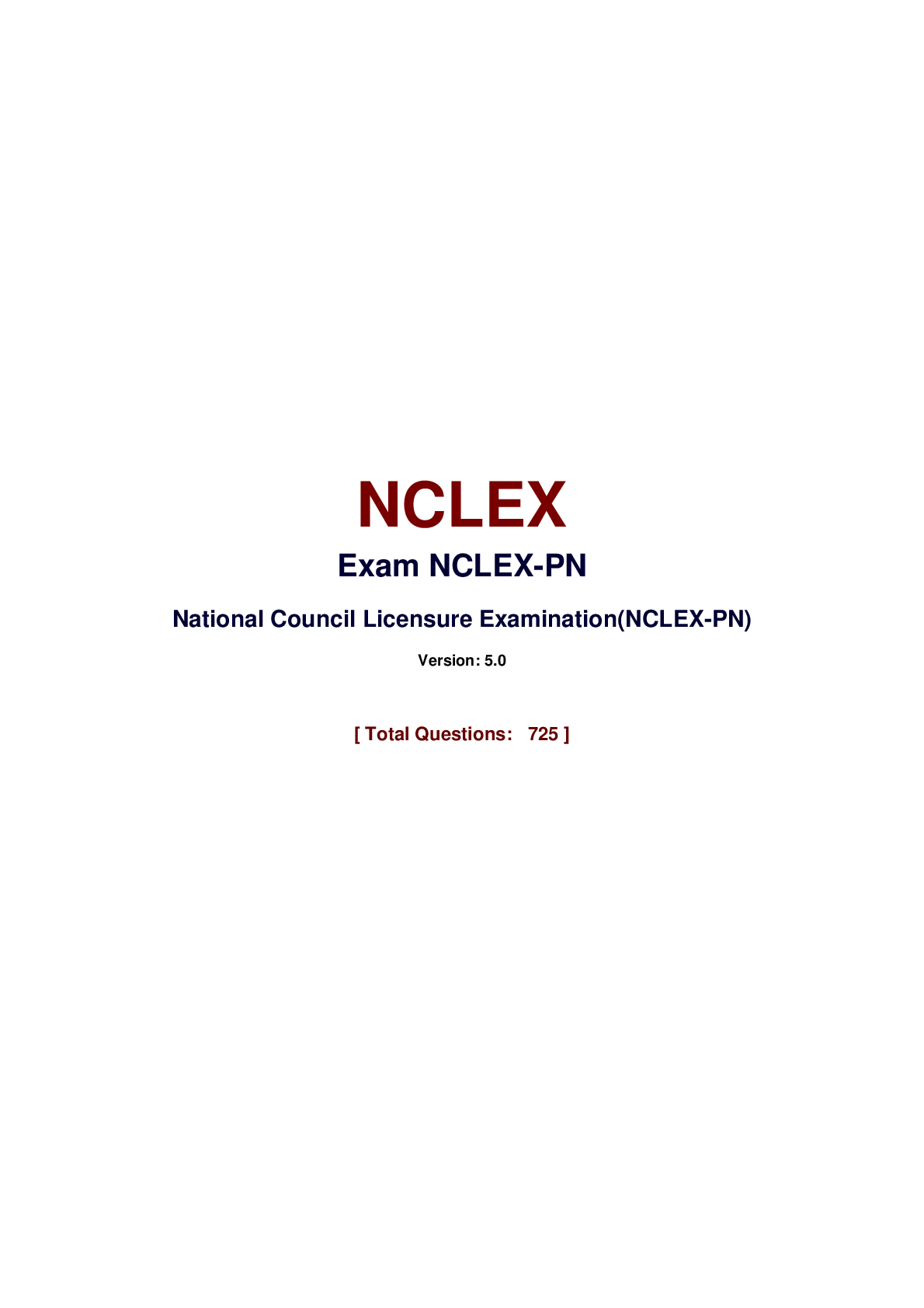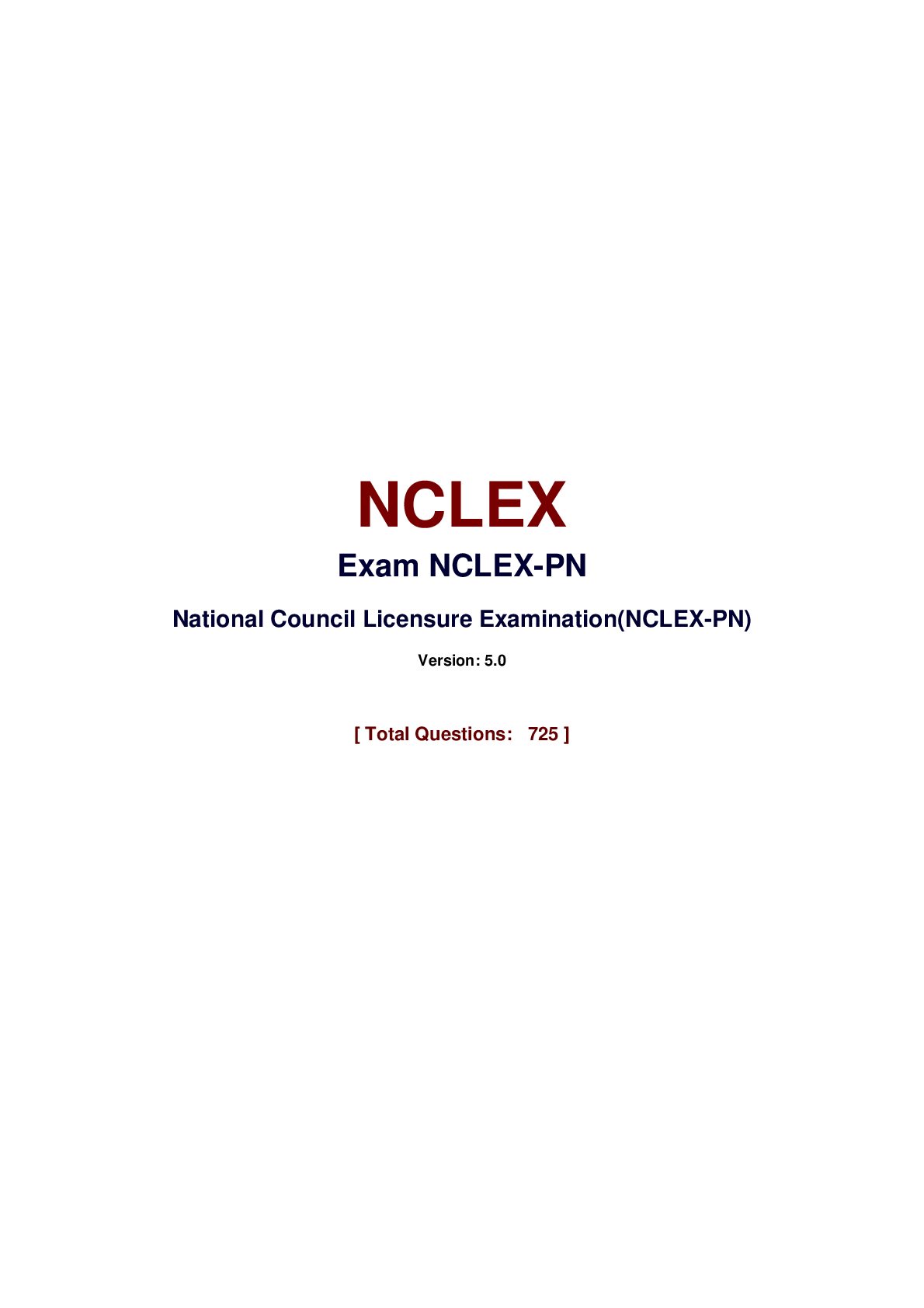Question No : 1 - (Topic 1)
Teaching the client with gonorrhea how to prevent reinfection and further spread is an example of:
A. primary prevention.
B. secondary prevention.
C. tertiary prevention.
D. primary health care prevention.
Answer: B
Explanation:
Secondary prevention targets the reduction of disease prevalence and disease morbidity through early
diagnosis and treatment.Physiological Adaptation
Question No : 2 - (Topic 1)
Which of the following foods is a complete protein?
A. corn
B. eggs
C. peanutsDsunflower seeds
Answer: B
Explanation:
Eggs are a complete protein. The remaining options are incomplete proteins.Health Promotion and
Maintenance
Best Solution to Pass Your Exam 3
NCLEX NCLEX-PN : Practice Test
Question No : 3 - (Topic 1)
Broccoli, oranges, dark greens, and dark yellow vegetables can be eaten to:
A. supplement vitamin pills.
B. balance body molecules.
C. cure many diseases.
D. help improve body defenses.
Answer: D
Explanation:
Controversy over what types of food to eat and not eat is still under investigation. Certain foods can help
improve body defenses to possibly prevent certain diseases.Nonpharmacological Therapies
Question No : 4 - (Topic 1)
The major electrolytes in the extracellular fluid are:
A. potassium and chloride. B. potassium and phosphate. C. sodium and chloride.
D. sodium and phosphate.
Answer: C
Explanation:
Sodium and chloride are the major electrolytes in the extracellular fluid.Physiological Adaptation
Question No : 5 - (Topic 1)
Best Solution to Pass Your Exam 4
NCLEX NCLEX-PN : Practice Test
Which of the following nursing diagnoses might be appropriate as Parkinson’s disease progresses and complications develop?
A. Impaired Physical Mobility B. Dysreflexia
C. Hypothermia
D. Impaired Dentition
Answer: A
Explanation:
The client with Parkinson’s disease can develop a shuffling gait and rigidity, causing impaired physical
mobility. The other diagnoses do not necessarily relate to a client with Parkinson’s disease.Reduction of Risk
Potential
Question No : 6 - (Topic 1)
Which of the following is an inappropriate item to include in planning care for a severely neutropenic client?
A. Transfuse netrophils (granulocytes) to prevent infection.
B. Exclude raw vegetables from the diet.
C. Avoid administering rectal suppositories.
D. Prohibit vases of fresh flowers and plants in the client’s room.
Answer: A
Explanation:
Granulocyte transfusion is not indicated to prevent infection. Produced in the bone marrow, granulocytes
normally comprise 70% of all WBCs. They are subdivided into three types based on staining properties:
neutrophils, eosinophils, and basophils. They can be beneficial in a selected population of infected, severely
granulocytopenic clients (less than 500/mm3) who do not respond to antibiotic therapy and who are expected
Best Solution to Pass Your Exam 5
NCLEX NCLEX-PN : Practice Test
to experience prolonged suppression of granulocyte production.Physiological Adaptation
Question No : 7 - (Topic 1)
A primary belief of psychiatric mental health nursing is:
A. most people have the potential to change and grow.
B. every person is worthy of dignity and respect.
C. human needs are individual to each person.
D. some behaviors have no meaning and cannot be understood.
Answer: B
Explanation:
Every person is worthy of dignity and respect. Every person has the potential to change and grow. All people
have basic human needs in common with others. All behavior has meaning and can be understood from the
client’s perspective.Psychosocial Integrity
Question No : 8 - (Topic 1)
A teenage client is admitted to the hospital because of acetaminophen (Tylenol) overdose. Overdoses of acetaminophen can precipitate life-threatening abnormalities in which of the following organs?
A. lungs
B. liver
C. kidneys
D. adrenal glands
Answer: B
Explanation:
Best Solution to Pass Your Exam 6
NCLEX NCLEX-PN : Practice Test
Acetaminophen is extensively metabolized in the liver. Choices 1, 3, and 4 are incorrect because prolonged
use of acetaminophen might result in an increased risk of renal dysfunction, but a single overdose does not
precipitate life-threatening problems in the respiratory system, renal system, or adrenal glands.Pharmacological
Therapies
Question No : 9 - (Topic 1)
All of the following factors, when identified in the history of a family, are correlated with poverty except:
A. high infant mortality rate.
B. frequent use of Emergency Departments. C. consultation with folk healers.
D. low incidence of dental problems.
Answer: D
Explanation:
Dental problems are prevalent because of the lack of preventive care and access to care. High infant mortality
is one of the most significant problems correlated with poverty. Pregnant women who do not have access to
care might come to the Emergency Department when in labor. Those in poverty are likely to use Emergency
Departments because they may not be turned away. Those in poverty might also turn to folk healers or other
persons in their community for care who might be easier to access and might not demand payment.Health
Promotion and Maintenance
Question No : 10 - (Topic 1)
Best Solution to Pass Your Exam 7
NCLEX NCLEX-PN : Practice Test
Acyclovir is the drug of choice for:
A. HIV.
B. HSV 1 and 2 and VZV. C. CMV.
D. influenza A viruses.
Answer: B
Explanation:
Acyclovir (Zovirax) is specific for treatment of herpes virus infections. There is no cure for herpes. Acyclovir
is excreted unchanged in the urine and therefore must be used cautiously in the presence of renal impairment.
Drugs that treat herpes inhibit viral DNA replication by competing with viral substrates to form shorter,
ineffective DNA chains.Physiological Adaptation
Question No : 11 - (Topic 1)
Ashley and her boyfriend Chris, both 19 years old, are transported to the Emergency Department after being involved in a motorcycle accident. Chris is badly hurt, but Ashley has no apparent injuries, though she appears confused and has trouble focusing on what is going on around her. She complains of dizziness and nausea. Her pulse is rapid, and she is hyperventilating. The nurse should assess Ashley’s level of anxiety as:
A. mild.
B. moderate. C. severe. D. panic.
Answer: C
Explanation:
The person whose anxiety is assessed as severe is unable to solve problems and has a poor grasp of what’s
happening in his or her environment. Somatic symptoms such as those described by Ashley are usually present.
Best Solution to Pass Your Exam 8
NCLEX NCLEX-PN : Practice Test
Vital sign changes are observed. The individual with mild anxiety might report being mildly uncomfortable and
might even find performance enhanced. The individual with moderate anxiety grasps less information about the
situation, has some difficulty problem-solving, and might have mild changes in vital signs. The individual in
panic demonstrates markedly disturbed behavior and might lose touch with reality.Psychosocial Integrity
Question No : 12 - (Topic 1)
Which of the following methods of contraception is able to reduce the transmission of HIV and other STDs?
A. intrauterine device (IUD) B. Norplant
C. oral contraceptives
D. vaginal sponge
Answer: D
Explanation:
The vaginal sponge is a barrier method of contraception that, when used with foam or jelly contraception,
reduces the transmission of HIV and other STDs as well as reducing the risk of pregnancy. IUDs, Norplant,
and oral contraceptives can prevent pregnancy but not the transmission HIV and STDs. Clients using the
contraceptive methods in Choices 1, 2, and 3 should be counseled to use a chemical or barrier contraceptive
to decrease transmission of HIV or STDs.Health Promotion and Maintenance
Read More


